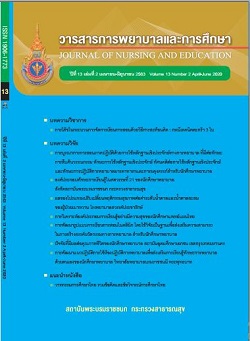ผลของโปรแกรมปรับเปลี่ยนพฤติกรรมสุขภาพต่อค่าระดับน้ำตาล และน้ำตาลสะสมของผู้ป่วยเบาหวาน โรงพยาบาลสวรรค์ประชารักษ์
The Effect of Health Behavior Modification Program on the Blood Glucose and HbA1c Level among Diabetic Patients Sawanpracharak Hospital
คำสำคัญ:
โปรแกรมปรับเปลี่ยนพฤติกรรมสุขภาพ, ผู้ป่วยโรคเบาหวานบทคัดย่อ
บทคัดย่อ
การวิจัยครั้งนี้เป็นการวิจัยกึ่งทดลอง แบบหนึ่งกลุ่มวัดก่อนหลัง มีวัตถุประสงค์เพื่อเปรียบเทียบค่าระดับน้ำตาล และระดับน้ำตาลสะสมในเลือดก่อนและหลังการเข้าร่วมโปรแกรมปรับเปลี่ยนพฤติกรรมสุขภาพสำหรับผู้ป่วยเบาหวาน การพัฒนาโปรแกรมใช้แนวคิด Trans-Theoretical Model (TTM) และแบบแผนความเชื่อด้านสุขภาพ กลุ่มตัวอย่างเลือกแบบเฉพาะเจาะจง จากผู้ป่วยเบาหวานที่มารับการรักษาที่คลินิกเบาหวาน โรงพยาบาลสวรรค์ประชารักษ์ สุ่มตัวอย่างอย่างง่ายด้วยการจับฉลาก จำนวน 30 คน เครื่องมือวิจัย ได้แก่ โปรแกรมที่พัฒนาขึ้น ใช้เวลา 7 สัปดาห์ ตรวจสอบคุณภาพโดยผู้เชี่ยวชาญ 3 คน มีความตรงเชิงเนื้อหา เท่ากับ 0.88 เครื่องมือที่ใช้ในเก็บข้อมูล ได้แก่ สมุดบันทึกการปรับเปลี่ยนพฤติกรรมสุขภาพ ประกอบด้วย แบบบันทึกข้อมูลส่วนบุคคล แบบบันทึกค่าระดับน้ำตาล และน้ำตาลสะสมในเลือด และแบบบันทึกการคำนวณพลังงานที่ได้รับ และการเผาผลาญในแต่ละวัน วิเคราะห์ข้อมูลโดยใช้สถิติพรรณนา และสถิติ Paired t-test
ผลการวิจัย เมื่อเปรียบเทียบก่อนและหลังการทดลอง พบว่า หลังการทดลองกลุ่มตัวอย่างมีค่าเฉลี่ยระดับน้ำตาลในเลือดลดลงอย่างมีนัยสำคัญทางสถิติ (Mean ±S.D. =122.27± 27.27และ 189.73±66.18 mg/dLตามลำดับ) (t= 6.229, p<.01) และค่าเฉลี่ยระดับน้ำตาลสะสมลดลงอย่างมีนัยสำคัญทางสถิติ (Mean ±S.D. =8.00 ± 0.908และ 8.51±0.941 % ตามลำดับ)
สรุป ผลการศึกษาให้ข้อเสนอแนะว่าการใช้โปรแกรมการปรับเปลี่ยนพฤติกรรมสุขภาพทำให้ผู้ป่วยเบาหวานปรับพฤติกรรมตามแนวคิด Trans Theoretical Model (TTM) และแบบแผนความเชื่อด้านสุขภาพ ส่งผลให้ค่าระดับน้ำตาลและน้ำตาลสะสมในเลือดลดลง และควรทำวิจัยโดยมีกลุ่มเปรียบเทียบ โปรแกรมปรับเปลี่ยนพฤติกรรมสุขภาพ เป็นการตัดสินใจในการปรับเปลี่ยนพฤติกรรมและความเชื่อด้านสุขภาพ โดยการใช้การทบทวนพฤติกรรมของตนเอง การแลกเปลี่ยนเรียนรู้ การทบทวนการปฏิบัติตนเรื่องการรับประทานอาหาร การออกกำลังกาย วิธีการคลายความเครียด และการรับรู้ความเสี่ยงของการทำให้โรคมีความรุนแรงมากขึ้น ส่งผลให้ผู้ป่วยเบาหวานปรับพฤติกรรมจนทำให้ระดับน้ำตาลและน้ำตาลสะสมลดลง ดังนั้นควรนำมาใช้ในการส่งเสริมให้ผู้ป่วยเห็นสำคัญและตระหนักในการดูแลตนเอง
เอกสารอ้างอิง
1. International Diabetes Federation: IDF. Issue of Campaigning Campaign for Diabetes Day 2014 (Fiscal Year 2015). Copies, 2014.
2. Strategy and Planning Group Bureau of Non-Communicable Diseases Department of Disease Control. Strategic Plan for Prevention and Control National Non-Communicable Diseases, 5 Years (2017 - 2022): Emotion Art Co., Ltd.,2018.
3. Johnson SS, Paiva AL, Cummins CO, Johnson JL, Dyment SJ, Wright JA, Prochaska J O, Prochaska JM, & Sherman K.Transtheoretical Model-Based Multiple Behavior Intervention for Weight Management : Effectiveness on a Population Basis. Preventive Medicine. 46: 238-246: 2008.
4. Diabetes Association of Thailand. Diabetes Practice Guidelines 2011: Sri Muang Company Printing, 2011.
5. Munshi, M.N., et al.,. Joslin’s Diabetes Desk Book A guide for Primary Care Providers. Boston: Joslin Diabetes Center; 2010.
6. Provincial Health Nakhon SawanProvince.Report of the Provincial Level Inspection Report for Fiscal Year 2018.
7. Thai Diabetes Association.Diabetes Guidelines for 2017.Bangkok: Romyen Media, 2017.
8. Prochaska, J.O., & Velicer, W. F. The Transtheoretical Model of Health Behavior Change. American Journal of Health Promotion, 12, 38-48:1997.
9. Janz, N. K., & Becker, M. H. The Health Belief Model: a Decade Later. Health Education Quarterly, 11(1), 1-47:1984.
10. Cohen, J. Statistical Power Analysis for the Behavioral Sciences. Hillsdale, NJ.: Lawrence Erlbaum Associate:1988.
11. Kaweekorn, P., Prasomruk, P. A Model Development of Self - Care Behavior for Blood Sugar Control among Type 2 Diabetic Patients, In Loengnoktha Crown Prince Hospital. Community health, 4(3): 307-324:2016. (in Thai).
12. Pechsombut, R. Reducing Stresses in Type 2 Diabetes Patients Atients Using A Modified Brain Fitness Program. Research and Statistics in Cognitive Science. Brapha University, 2018.
13. Phermsin, S., Duangsong, R. The Effects of the Application by Health Belief Model and Social Support to Control Blood Sugar Among Diabetes Mellitus Type 2 Patients, Ubolratana District, Khon Kaen Province .KKU Res J (GS) 2011; 11 (4):89-100. (in Thai)
14. Kessin, J., Wiruchagool, P.,Lonil, A. Self-management, Knowledge, Quality of life in New Cases with Type II Diabetes Mellitus, Pre-Post Type II Diabetes Patients Self- Management Program in Urban Areas, Uthaithani Province. Journal of Nursing Division 2013; 40(1). (in Thai).
15. Pethchit,R.Self-Care Behaviors and Blood Sugar Control among Patients with Diabetes Mellitus at Khiensa Hospital, Suratthani Province.The Southern College Network Journal of Nursing and Public Health 2014; 2(2):15-28. (in Thai)
16. Pornprayut, C., Toonsiri, C., Rattanagreethakul, S. Effects of Coaching Program on Diabetes Behavioral Control and HbA 1 C among Persons with Type 2 Diabetes Mellitus. The Journal of Faculty of Nursing Burapha University 2017; 25(4). (in Thai).
17. Sutanakoh C. and Sohta C. Effects of Self Management Program on Glycemic Control in Patients with Type 2 Diabetes. Journal of Nursing and Education 2017; 9(2). (in Thai).






